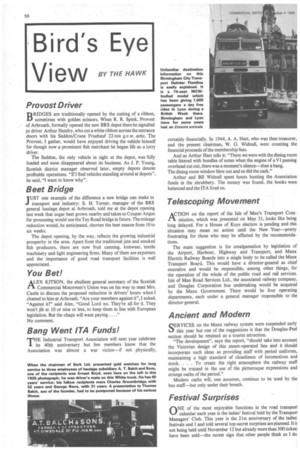Bird's Eye
Page 58

If you've noticed an error in this article please click here to report it so we can fix it.
ViewBY THE HAWK
Provost Driver
Dp RIDGES are traditionally opened by the cutting of a ribbon, sometimes with golden scissors. When R. R. Spink, Provost of Arbroath, formally opened the new BRS depot there he signalled Ie. driver Arthur Hendry, who cut a white ribbon across the entrance doors with his Seddon/Crane Fruehauf 22-ton g.v.w..artic. The Provost, I gather, would have enjoyed driving the vehicle himself for though now a prominent fish merchant he began life as a lorry driver. The Seddon, the only vehicle in sight at the depot, was fully loaded and soon disappeared about its business. As J. P. Young, Scottish district manager observed later, empty depots denote profitable operations. "If I find vehicles standing around at depots", he said, "I want to know why".
Beet Bridge
JUST one example of the difference a new bridge can make to transport and industry: S. H. Turner, manager of the BRS general haulage depot at Arbroath, told me at the depot opening last week that sugar beet grown nearby and taken to Coupar Angus for processing would use the Tay Road bridge in future. The mileage reduction would, he anticipated, shorten the beet season from 10 to six weeks. The depot opening, by the way, reflects the growing industrial prosperity in the area. Apart from the traditional jute and smoked fish producers, there are now fruit canning, knitwear, textile machinery and light engineering firms. Many of them are exporters and the importance of good road transport facilities is well appreciated.
You Bet!
ALEX KITSON, the ebullient general secretary of the Scottish Commercial Motormen's Union was on his way to meet Mrs. Castle to discuss the proposed reduction in drivers' hours when I chatted to him at Arbroath. "Are your members against it", I asked. "Against it!" said Alex, "Good Lord no. They're all for it. They won't jib at 10 or nine or less, to keep them in line with European legislation. But the chaps will want paying... ."
No comment.
Bang Went ITA Funds!
THE Industrial Transport Association will next year celebrate its 40th anniversary but few members know that the Association was almost a war victim—if not physically, certainly financially. In 1944, A. A. Hart, who was then treasurer, and the present chairman, W. G. Widnall, were counting the financial proceeds of the membership fees. And as Arthur Hart tells it: "There we were with the dining room table littered with bundles of notes when the engine of a V1 passing overhead cut out, there was a moment's silence—then a bang. The dining room window blew out and so did the cash." Arthur and Bill Widnall spent hours hunting the Association funds in the shrubbery. The money was found, the books were balanced and the ITA lived on.
Telescoping Movement
ATION on the report of the Isle of Man's Transport Commission, which was presented on May 31, looks like being long delayed. For a House of Keys election is pending and this situation may mean no action until the New Year—pretty frustrating for those who may be affected by the recommendations. The main suggestion is for amalgamation by legislation of the Airport, Harbour, Highway and Transport, and Manx Electric Railway Boards into a single body to be called the Manx Transport Board. This would have a director-general as chief executive and would be responsible, among other things, for the operation of the whole of the public road and rail services. Isle of Man Road Services Ltd., the associated railway company, and Douglas Corporation bus undertaking would be acquired by the Manx Government. There would be four operating departments, each under a general manager responsible to the director-general.
Ancient and Modern
SERVICES on the Manx railway system were suspended early this year but one of the suggestions is that the Douglas-Peel section should be retained as a tourist attraction. "The development", says the report, "should take into account the Victorian design of this steam-operated line and it should incorporate such ideas as providing staff with period uniforms, maintaining a high standard of cleanliness of locomotives and stock. . . . To create the right atmosphere the railway staff might be trained in the use of the picturesque expressions and strange oaths of the period."
Modern oaths will, one assumes, continue to be used by the bus staff—but only under their breath.
Festival Surprises
ONE of the most enjoyable functions in the road transport calendar each year is the ladies' festival held by the Transport Managers' Club. This year is the 21st anniversary of the ladies' festivals and I and told several top-secret surprises are planned. It is. not being held until November 12 but already more than 300 tickets have been sold—the surest sign that other people think as I do








































































































































































